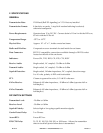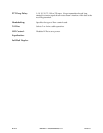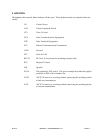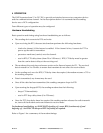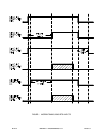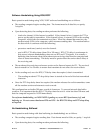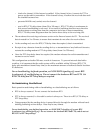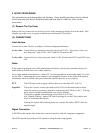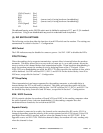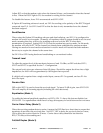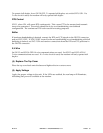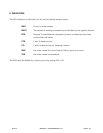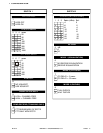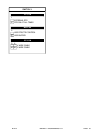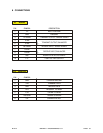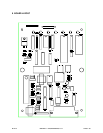GND (Chassis) Pin 1
TXD Pin 2
RXD Pin 3
RTS Pin 4 (connect only if using hardware handshaking)
CTS Pin 5 (connect only if using hardware handshaking)
GND (Signal) Pin 7
CD Pin 8
The cable and housing on the DB-25S socket must be shielded to conform to FCC, part 15-J/A standards
for emissions. Using a non-shielded cable may result in undesirable radio interference.
(3) DIP SWITCH SET TINGS
The following section describes the function of each DIP switch on the modem. The settings are
summarized in a table in Section 7 - Configuration.
LED Con trol
The LED indicators may be disabled to conserve power. Set SW1.1 OFF to disable the LEDs.
RTS/CTS De lay
When the sending device requests transmission, a preset delay is inserted before the modem
transmits. This delay allows the two-way radio to warm up, or, on a cable system, allows the
tones to settle on the channel before data transmission begins. When hardware handshaking is
used, the modem pauses the sending device by delaying return of the CTS signal. When
XON/OFF or no handshaking are used, the RTS/CTS delay specifies the amount of data which
will be buffered. Set DIP switches SW1.2, SW1.3, and SW1.4 for the desired delay, from 20 to
1000 msec, as specified in Section 7 - Configuration.
PTT Drop De lay
When transmission is no longer requested by the sending computer, a selectable delay is
inserted before the PTT on the radio is released. This delay prevents the squelch tail at the
receiving radio from interfering with the data. Set DIP switches SW1.5, SW1.6, and SW1.7 for
the desired drop delay, between 0 and 500 msec, as specified in Section 7 - Configuration.
XON / XOFF Con trols
SW1.8 controls whether the modem will send XON and XOFF to the sending computer when
the radio channel is busy (software handshaking). If the sending computer does not
understand these characters, the switch must be OFF.
Squelch Po lar ity
If the modem is connected to a radio, the channel can be monitored for RF carrier. SW1.9 is
changed depending upon the polarity of the carrier operated switch (COS) signal. If the COS
goes high when carrier is present, and low when the channel is free, set SW1.9 OFF. If the
opposite occurs, set SW1.9 ON. While the channel is busy, the modem will wait, sending only
when the channel is clear.
B1474
BARNETT EN GI NEERING LTD.
PAGE
13



